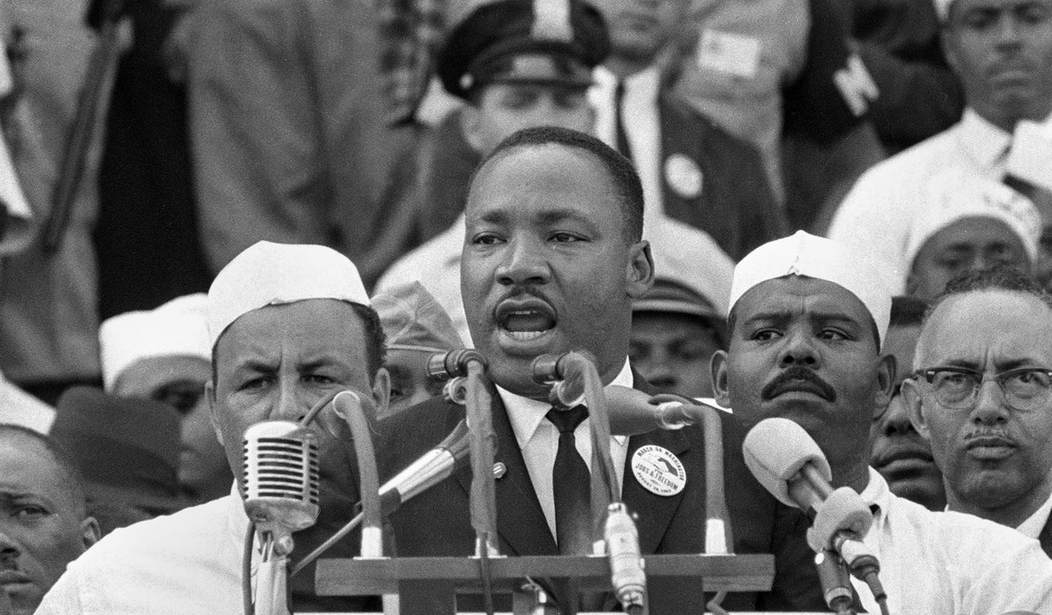What would Martin Luther King believe if he were alive today?
King lobbied for federal assistance to the poor and for a form of wealth redistribution, but he was no Communist. He was in favor of affirmative action. But it was a much different kind of "affirmative action" than the quota-based programs today.
King sought equality, not "equity." In fact, although he was a "radical" by any standard, King firmly believed that America could be redeemed. He envisioned an America where children would be judged by the "content of their character" and not the "color of their skin."
King is easily the most misunderstood and the most misinterpreted American icon of the 20th century and probably in American history. He's been a hero, a villain, a paragon of virtue, and an adulterer. It's impossible not to have a strong opinion of him.
The fight over his legacy is central to our political arguments today. Affirmative action, diversity, equity, and inclusion, "white supremacy," and "privilege" all are remnants of King's vision. And those who debate these issues appeal to King's words and ideas for confirmation that they're right and their opponents are wrong.
It's too easy to pigeonhole King as a radical leftist. That's a shallow view of an extraordinarily complex man. Many Americans are inspired by King's vision of a colorblind society.
As a child, legal activist Edward Blum said he grew up discussing civil rights at the dinner table. Decades later, his fight for equality would take him all the way to the Supreme Court where he was the legal strategist behind Students for Fair Admissions, Inc. v. President and Fellows of Harvard College, the case that dismantled affirmative action in college admissions.
Blum told CNN he was inspired by King’s speech from the March on Washington – specifically the idea that people shouldn’t be judged “by the color of their skin” – to launch a lifelong crusade against affirmative action practices.
He said he’s dedicated his career to trying to “re-establish this great legal covenant of color-blindness.”
“Americans of all races wholly understand that Dr. King’s most enduring line from his ‘I Have a Dream’ speech means that an individual’s skin color should not be used to help, or harm, them in their life’s endeavors,” Blum told CNN.
“Dr. King’s ['I Have a Dream'] quote means that affirmative action is polarizing, unfair and illegal,” he added.
King's youngest daughter Bernice disagrees with what people like Blum interpret from the "I Have a Dream" speech.
“People using ‘not be judged by the color of their skin, but by the content of their character’ to deter discussion of, teaching about, and protest against racism are not students of the comprehensive MLK,” King posted last August on X, formerly known as Twitter.
“My father’s dream and work included eradicating racism, not ignoring it.”
No one is arguing against that. But how does supporting affirmative action "eradicate racism"? If you believe only whites can be racists, one can imagine a world where blacks get even for 300 years of oppression by turning the tables on whites and denying them opportunities, creating barriers to education and employment for them.
No, it isn't fair. And Martin Luther King didn't want that any more than he wanted racism to flourish.
Are we closer to King's vision today? Sadly, I don't see how anyone can say we are.
Martin said as long as race remains a “strong determinant of where one lives, goes to school, income, encounters with police,” he feels American society still has a long way to go before achieving Dr. King’s dream.
While they disagree on whether King would have supported affirmative action and DEI to bring about a more inclusive society, both Blum and Martin said America must continue King’s work to dismantle the legacy of racism.
“Most Americans don’t think how someone looks, tells them much about who they are as an individual,” Blum said. “And that is a deeply embedded American belief.”
Martin said he sees our country’s progress toward King’s vision as an ongoing journey.
Indeed, it's a journey with potholes and pitfalls. But we'll get there. As long as people are inspired by those words of freedom and equality, and work to make them real, the future is assured.










Join the conversation as a VIP Member